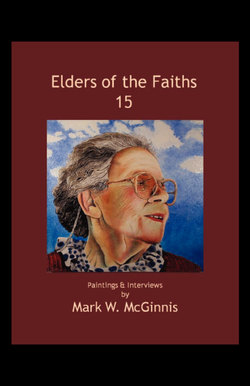Читать книгу Elders of the Faiths 15 - Mark McGinnis - Страница 3
На сайте Литреса книга снята с продажи.
Beryl Blake
Оглавлениеborn 1911
Beryl Blake has been member of the Methodist Church all her adult life. She had a long career as a social worker with an emphasis in child welfare and is now retired in Watertown, South Dakota.
Question: What is your spiritual tradition and how does it form a foundation for your life?
Answer: I grew up in a very spiritual home. My family had their own ideas, but they also had a sense of tolerance of other ideas as well. It was the horse and buggy days and we had pastors that came out from town to preach in our school on Sundays. We would have a variety of ministers of various denominations that would preach to us. We would go to church no matter which preacher was there. My parents felt we were in need of spiritual guidance and were very uncritical of the ministers. My parents would say when they did not agree with the pastors but they were careful never to put them down in front of the children. They would explain why they didn’t agree, but they would make it clear that their disagreement did not make the minister wrong, as everyone has the right to their own beliefs. My mother was a Baptist and my father was a Methodist. Later in my childhood, Mother even taught Sunday school in both churches. Sometimes they would go to services at the Baptist church, sometimes at the Methodist church. We children were allowed to go to whichever church we wanted, and we were not baptized until we were adolescents and could understand what baptism meant. My parents, through my religious traditions, taught me to accept people where they are.
Q: How has your religion and religious practice given meaning to your life?
A: My religion is the core of my life. Religion is the center and creates meaning in what I have planned for my life. God as the Holy Spirit is my guide in this planning. God is my center, and to me God is a spirit and not a being. I don’t know if God is a he or a she and I don’t care. Too many people get hung up on little things when it comes to religion and miss the more important matters. I need the community of the church. I need the strength of the group and the support of people that I know will stand by me.
Q: What do you believe are the most important values to uphold and promote?
A: Which values I think are the most important would change depending on which day you might ask me. Today I might say integrity. But then I think of all the white lies I have told to spare others feelings — that’s not integrity, but maybe it is. Another important value is openness, but then I think that openness is a value only to a certain point. Minds must be open to solve problems, but there is also merit in some firmness of beliefs. Patience is another important virtue, but again how far do you go?
Q: What has given you the most joy in your life?
A: I have been given great joy in my life by the love of family and friends and people in general, and I interpret that as the love of God coming through them. I also received much happiness through my work, as I always loved my work. When I think of the afterlife and think of some people’s description of heaven as doing nothing! I don’t think it’s going to be that way. I hope we will have things to do; we will continue to be productive.
Q: What are your hopes for the future?
A: I hope daily for more awakening to understand the power that lies within us. There is so much we have yet to learn of each individual’s potential and how to release it.
Q: If there was one thing you could communicate to youth, what would it be?
A: Unless the youth ask for advice, I wouldn’t give it. Young people don’t learn from what you tell them; they learn from your actions. If anyone would ask me, I would first say, “Be kind.” I feel that young people don’t think often enough of the consequences of their actions. We as parents are often too protective. If a youngster should climb a tree, fall and break an arm it will mend. It is better to break an arm than to be afraid to reach for challenges.
